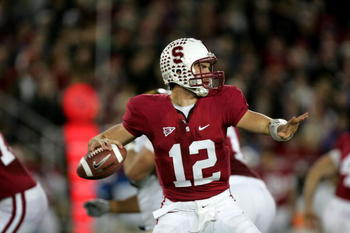Allow me to go back in time to last June. I sat in Columbus Crew Stadium watching the inagural USA College Sevens rugby tournament. The best rugby teams from around the country came together for this wide-open, entertaining competition that highlighted rugby sevens as a future Olympic sport. As I watched several games throughout the tournament, one man caught my eye from Utah. A mountain of a man of Samoan descent with long black hair in the red #2 jersey. He was simply bigger than everyone else on the field, and to my shock, faster too. And if that wasn't enough, he had the NCAA '10 highlight stick at his disposal like it was the simple flick of a thumb. Game after game, #2 from Utah ran in try after try as the Utes advanced through the tournament. He ran around tacklers, through tacklers, and past tacklers. As the tournament progressed, this mythical creature became the talk of Crew Stadium.
But #2 and his Utes met the toughest test imaginable in the final - the Cal Bears. All you need to know about college rugby is this... Cal. Wins. Everything. They have only 25 National Championships to their name and the consensus favored the Bears adding the presitgious sevens tourney to the trophy case. Except, this Herculean force of nature from Utah had other ideas. Utah stunned the Bears in a thrilling game 31-26 in overtime, largely thanks to two tries from #2, the hero of the tournament.
Utah's #2 was a 21 year old freshman, Thretton Palamo... the youngest player to ever take the field in the Rugby World Cup when he did so in 2007 for the USA national team in France. A former captain of the USA rugby sevens team. And as of this Fall, a running back for Kyle Whittingham's Utah football team. And quite possibly, the most interesting man in college football...
But #2 and his Utes met the toughest test imaginable in the final - the Cal Bears. All you need to know about college rugby is this... Cal. Wins. Everything. They have only 25 National Championships to their name and the consensus favored the Bears adding the presitgious sevens tourney to the trophy case. Except, this Herculean force of nature from Utah had other ideas. Utah stunned the Bears in a thrilling game 31-26 in overtime, largely thanks to two tries from #2, the hero of the tournament.
Utah's #2 was a 21 year old freshman, Thretton Palamo... the youngest player to ever take the field in the Rugby World Cup when he did so in 2007 for the USA national team in France. A former captain of the USA rugby sevens team. And as of this Fall, a running back for Kyle Whittingham's Utah football team. And quite possibly, the most interesting man in college football...
For the readers that may be familiar with rugby, watching Palamo anihilate the college sevens tournament last year must have been what it was like to watch Jonah Lomu at his peak. Even though there were dozens of games each day, I wanted to be in Crew Stadium when Utah was playing to watch Thretton Palamo. The level of competition was inconsequential at that point and time - what I saw that weekend (and what viewers saw nationally on NBC) was transcendent. Palamo is a world class rugby sevens player with athleticism to match. Here's a 6'2", 240 pound rock of granite that also had the ability to sidestep any defender, the pace to outrun the others, and the power to brush off anyone else that may have gotten in his way. Any time he touched the ball, the crowd on hand would slowly out of their seats like they would for Gale Sayers or Reggie Bush. Any time he touched the ball, you knew he was likely to score. It didn't just look like a man against boys, it was like watching Gravedigger do his (her?) thing. Just see for yourself...
And now Palamo takes those talents from the pitch to the gridiron. The trip from teenage international rugby player to Utah running back is in the words of Bill Walton, a long strange trip. Palamo was teammates on that '07 RWC team with Utah rugby head coach Blake Burdette, who also happened to be a member of the Utes' 2004 unbeaten Fiesta Bowl team. Utah was the perfect fit for Palamo's rugby skills, desire to play football, and committment to get an education. In fact, Palamo chose this path at Utah turning down opportunites to play professional rugby in Europe. To tell you the truth, I was stunned and excited when I read his name in the rotation at running back for the Utes this year because I saw his athletic genius with my own eyes. Sure, Youtube highlight videos are all the rage for college prospects, but nobody has quite the resume of Thretton Palamo to back it up.
Just how much of a factor can he be for the Utes though? It appears Palamo will start the season as a backup to JuCo transfer John White even though he led the Utes in rushing during their first Spring scrimmage. Palamo did play football in high school, but the learning curve is still steep. To his credit, Whittingham and the staff see a bright future for the rugby star, but his impact may not be felt immediately. Actually, Palamo may never make a significant impact in football, period. Transitions between sports are always difficult, no matter the athletic gifts one may possess. Reading blocks, running routes, and completing blocking assignments is way different than offloading in the tackle, rucking, and running through the gaps of a rugby defense. The level of athlete from college rugby to Pac 12 football is also a huge step up in class. No longer will Thretton Palamo be the most gifted athlete on the field by light years. To his credit though, the coaching staff and players see Palamo's potential...
even though he led the Utes in rushing during their first Spring scrimmage. Palamo did play football in high school, but the learning curve is still steep. To his credit, Whittingham and the staff see a bright future for the rugby star, but his impact may not be felt immediately. Actually, Palamo may never make a significant impact in football, period. Transitions between sports are always difficult, no matter the athletic gifts one may possess. Reading blocks, running routes, and completing blocking assignments is way different than offloading in the tackle, rucking, and running through the gaps of a rugby defense. The level of athlete from college rugby to Pac 12 football is also a huge step up in class. No longer will Thretton Palamo be the most gifted athlete on the field by light years. To his credit though, the coaching staff and players see Palamo's potential...
“Thretton’s doing a good job,” (running backs coach Dave) Schramm said. “It just takes time. He’s got to learn how to play. And he is learning. He’s come a long way — light years since spring ball. But football isn’t rugby.”
Just how much of a factor can he be for the Utes though? It appears Palamo will start the season as a backup to JuCo transfer John White
 even though he led the Utes in rushing during their first Spring scrimmage. Palamo did play football in high school, but the learning curve is still steep. To his credit, Whittingham and the staff see a bright future for the rugby star, but his impact may not be felt immediately. Actually, Palamo may never make a significant impact in football, period. Transitions between sports are always difficult, no matter the athletic gifts one may possess. Reading blocks, running routes, and completing blocking assignments is way different than offloading in the tackle, rucking, and running through the gaps of a rugby defense. The level of athlete from college rugby to Pac 12 football is also a huge step up in class. No longer will Thretton Palamo be the most gifted athlete on the field by light years. To his credit though, the coaching staff and players see Palamo's potential...
even though he led the Utes in rushing during their first Spring scrimmage. Palamo did play football in high school, but the learning curve is still steep. To his credit, Whittingham and the staff see a bright future for the rugby star, but his impact may not be felt immediately. Actually, Palamo may never make a significant impact in football, period. Transitions between sports are always difficult, no matter the athletic gifts one may possess. Reading blocks, running routes, and completing blocking assignments is way different than offloading in the tackle, rucking, and running through the gaps of a rugby defense. The level of athlete from college rugby to Pac 12 football is also a huge step up in class. No longer will Thretton Palamo be the most gifted athlete on the field by light years. To his credit though, the coaching staff and players see Palamo's potential...“Thretton’s doing a good job,” (running backs coach Dave) Schramm said. “It just takes time. He’s got to learn how to play. And he is learning. He’s come a long way — light years since spring ball. But football isn’t rugby.”
“He’s one of those guys who has the inner desire to be great. He’ll get better with time, I think, and end up being a heck of a football player.”
“He’s still raw,” (QB Jordan) Wynn said. “But he’s so big and he’s super-athletic. He can run inside, obviously, but he’ll turn the corner on you, too.”
Everything coming out of Utah this preseason has Palamo dedicating himself to make the transition from international rugby star to college running back a success. If Palamo is able to grasp the position and fulfill his athletic potential, the possibilities are limitless. My only hope is that he gets a chance to prove what he can do as a runner on Saturdays because we've never had the chance to see an international caliber rugby player take on college football. If there is any way to translate the magic on the field at Columbus Crew Stadium last June to Rice-Eccles Stadium this Fall, Thretton Palamo may become a household name. And even if that doesn't happen, he's still the most interesting man in college football.
Everything coming out of Utah this preseason has Palamo dedicating himself to make the transition from international rugby star to college running back a success. If Palamo is able to grasp the position and fulfill his athletic potential, the possibilities are limitless. My only hope is that he gets a chance to prove what he can do as a runner on Saturdays because we've never had the chance to see an international caliber rugby player take on college football. If there is any way to translate the magic on the field at Columbus Crew Stadium last June to Rice-Eccles Stadium this Fall, Thretton Palamo may become a household name. And even if that doesn't happen, he's still the most interesting man in college football.
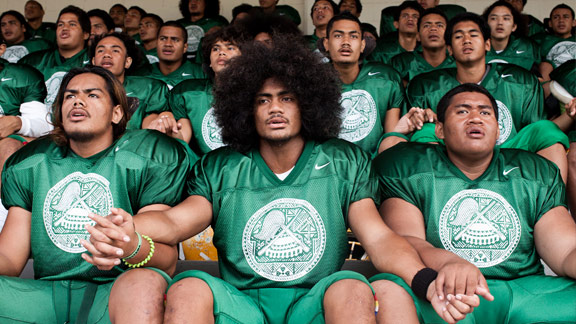 Chris Baldwin for ESPN The MagazineHigh school football players attend a three-day camp with Polamalu.
Chris Baldwin for ESPN The MagazineHigh school football players attend a three-day camp with Polamalu.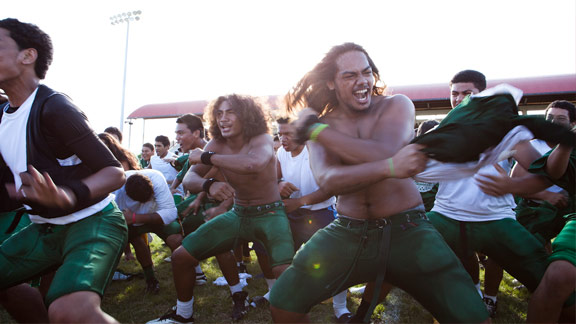 Chris Baldwin for ESPN The MagazineAfter hours of practice, Polamalu's trainees still have energy to spare.
Chris Baldwin for ESPN The MagazineAfter hours of practice, Polamalu's trainees still have energy to spare.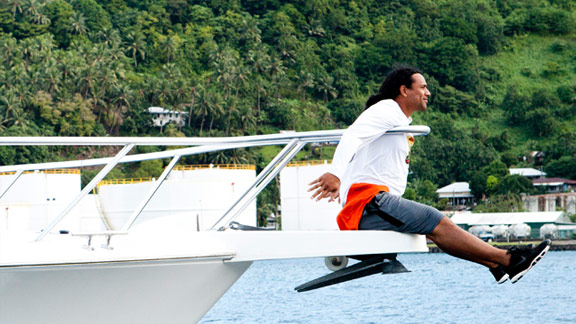 Chris Baldwin for ESPN The MagazinePolamalu says he feels most connected to the islands during two fishing trips.
Chris Baldwin for ESPN The MagazinePolamalu says he feels most connected to the islands during two fishing trips.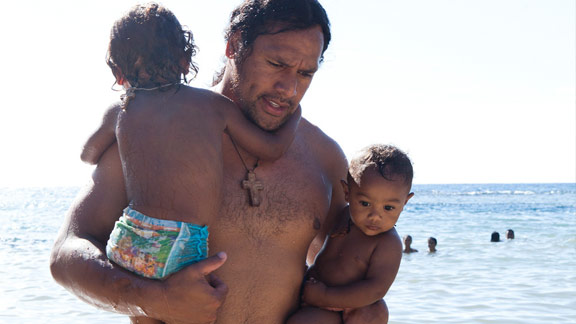 Chris Baldwin for ESPN The MagazineHis two kids help keep Polamalu grounded during the whirlwind trip.
Chris Baldwin for ESPN The MagazineHis two kids help keep Polamalu grounded during the whirlwind trip.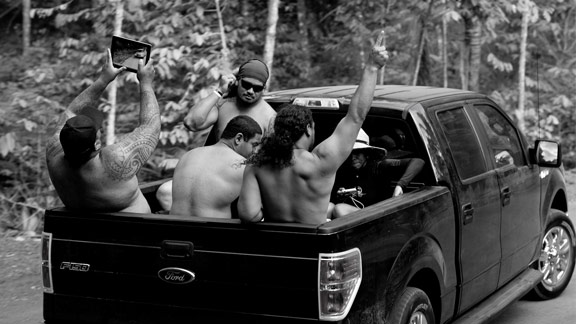 Chris Baldwin for ESPN The MagazinePolamalu takes a final "Samoan limo" ride before departing.
Chris Baldwin for ESPN The MagazinePolamalu takes a final "Samoan limo" ride before departing.